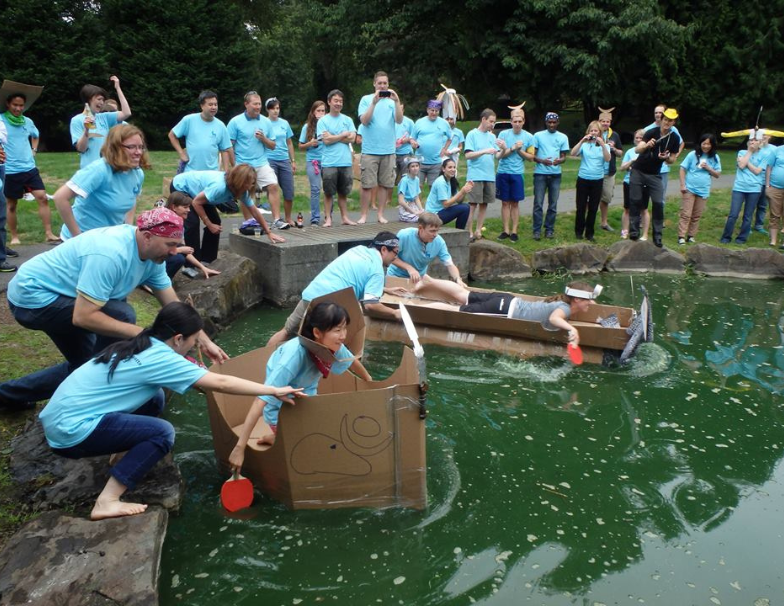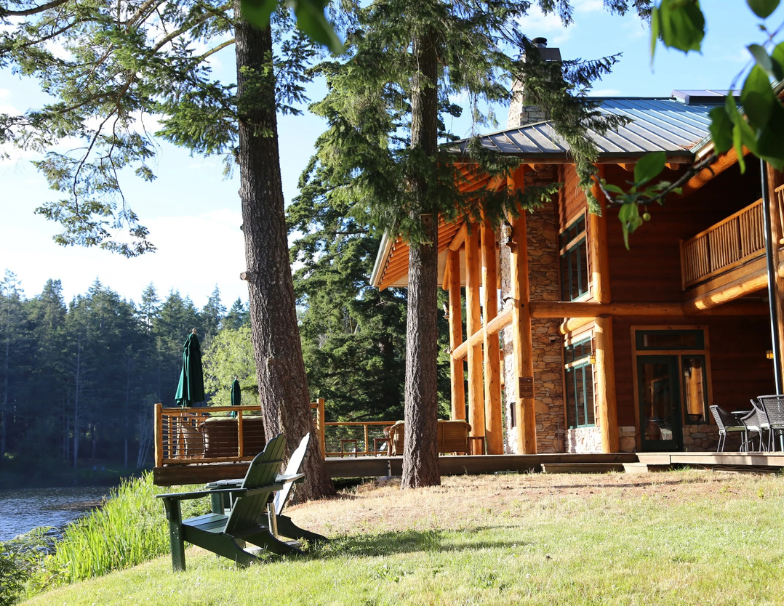Top 10 Company Retreats Ideas for Ultimate Team Building

Curious about company retreats? They are essential for boosting team cohesion and morale. This article lists the top 10 ideas for retreats that excel in building stronger teams.
Key Takeaways
- Company retreats uniquely blend work and play, fostering personal connections and enhancing communication among team members.
- Effective planning is crucial for successful retreats, emphasizing clear objectives, engaging agendas, budget considerations, and post-retreat follow-up.
- Top retreat ideas include outdoor activities, professional development workshops, and community service projects, each enhancing teamwork and company culture.
What is a company retreat?

A company retreat is an organized event designed to strengthen team engagement and align with the company’s strategic goals. Unlike regular business meetings, retreats blend work and play, offering a unique opportunity for team members to connect on a personal level. These events focus on fostering personal connections, deeper understanding, and improved communication among team members.
Retreats can range from a single day to several days and typically include a mix of educational workshops, recreational activities, and team-building exercises, including team retreats. The primary objective is to create an environment where employees can step away from their daily routines, engage in meaningful interactions, and rejuvenate their spirits.
Whether it’s a serene getaway or an adventurous outing, company retreats prioritize personal growth and team bonding over immediate business concerns.
Benefits of corporate retreats

Corporate retreats offer a plethora of benefits that go beyond the confines of the office. One of the most significant advantages is the boost in team morale and camaraderie that comes from engaging in shared challenges. When employees step out of their usual work environment, they can establish connections that transcend professional boundaries, leading to stronger bonds and improved trust during a corporate retreat.
Furthermore, retreats create a relaxed atmosphere where team members can communicate more freely, enhancing overall employee engagement. Collaborative exercises and team-building activities during these events foster better teamwork and cooperation towards common goals. By providing a structured yet enjoyable setting, corporate retreats help teams grow, innovate, and align more closely with the company’s vision.
In addition to strengthening relationships, retreats can also save time in the long run by addressing and resolving issues that might otherwise fester in a typical office setting. The focused environment of a retreat allows for deep, uninterrupted discussions and strategic planning, leading to actionable insights and more cohesive team dynamics. Ultimately, corporate retreats are a valuable investment in boosting team morale, enhancing company culture, and driving overall organizational performance.
Essential planning process for successful retreats
Planning a successful company retreat involves several critical steps that ensure the event meets its objectives and provides a memorable experience. The first step is to clearly identify and articulate the goals of the retreat. Whether the aim is to boost team morale, foster innovation, or address specific challenges, having clear objectives will guide the entire planning process.
Once the goals are set, it’s essential to create a structured agenda that balances engaging activities with focused work. This includes selecting activities that enhance strategic planning skills and promote team bonding. Additionally, involving team members in the planning process by gathering their feedback and preferences can increase engagement and make participants feel valued.
Budget considerations are also crucial in planning a retreat. Event planners, office managers, and admins typically handle the logistics, ensuring that the chosen venue and activities align with the budget while still meeting the retreat’s goals. Engaging an experienced facilitator can further enhance the effectiveness of the retreat by providing professional guidance and ensuring that objectives are met.
Establishing clear deliverables and follow-up strategies is the final step, ensuring that the insights gained during the retreat are translated into actionable steps.
Top 10 company retreat ideas for ultimate team building

Finding innovative and effective company offsite ideas for retreats can significantly enhance team bonding and employee engagement during a team offsite and team offsites. Here are the top 10 ideas that promise to deliver the ultimate team-building experiences, each designed to cater to different interests and objectives.
From adventurous outdoor activities to professional development workshops, these ideas will inspire and rejuvenate your team, fostering a stronger, more cohesive company culture.
Adventure and outdoor activities
For those looking to combine team building with a bit of adventure, outdoor activities are an excellent choice. Popular options include:
- Hiking
- Marathon training
- Biking
- Ski trips
All of these activities require teamwork and perseverance.
Activities like rafting and rock climbing not only provide an adrenaline rush but also necessitate collaboration among team members to overcome obstacles, fostering a sense of unity and mutual support.
When planning outdoor activities, it’s important to consider participants’ health issues or mobility requirements to ensure everyone can safely participate. Additionally, keeping an eye on weather conditions can help avoid any unpleasant surprises.
With an average cost per person ranging from $0 to $300, these activities are not only exciting but also budget-friendly.
Professional development workshops
Professional development workshops are a cornerstone of effective corporate retreats. These workshops are designed to enhance skills and strategies within the team, making them more adaptable and responsive to challenges. Leadership training, communication workshops, and problem-solving sessions can significantly strengthen the team’s overall capabilities, fostering better collaboration and team morale.
By aligning the outcomes of these workshops with the company’s objectives, teams become more integrated and focused on shared goals. This alignment ensures that the skills developed during the retreat are directly applicable to the team’s day-to-day activities, driving overall organizational performance and growth.
Ultimately, professional development workshops serve as a catalyst for both personal and professional growth, enhancing the team’s ability to tackle future challenges.
Volunteer and community service projects
Engaging in volunteer and community service projects during a company retreat can foster meaningful connections among team members while contributing to the greater good. Activities such as beach cleanups, tree planting, or volunteering at local shelters not only build trust but also provide a sense of accomplishment and connection to the company’s mission. These projects can significantly boost team morale and create a positive, lasting impact on the community.
For example, Salesforce is known for including volunteer work in its retreats, showcasing a commitment to community service and employee engagement. By participating in such initiatives, teams can develop a stronger sense of unity and purpose, enhancing collaboration and overall team dynamics.
Cultural immersion experiences
Cultural immersion experiences can be a transformative part of corporate retreats, fostering diversity and global business insights among team members. Activities like global exchange programs encourage employees to step out of their comfort zones and gain new perspectives that can enhance their approach to business. These experiences not only promote team bonding but also contribute to a more inclusive company culture.
By incorporating cultural immersion activities into retreats, companies can improve team dynamics and foster meaningful connections. These experiences are particularly valuable in today’s globalized business environment, where understanding and appreciating cultural differences can provide a competitive edge.
Health and wellness programs
Incorporating health and wellness programs into company retreats can lead to a healthier work environment and enhance employees’ physical and mental well-being. Activities such as yoga and meditation sessions promote mindfulness and help employees reconnect with themselves, reducing stress and improving focus.
Participation in wellness activities is linked to increased job satisfaction and productivity, creating a more positive and engaged workforce. By prioritizing health and wellness, companies can ensure that their employees are not only happier but also more effective in their roles.
Creative arts and crafts sessions
Creative arts and crafts sessions are a fantastic way to stimulate creativity and relaxation among team members. Workshops can include activities such as:
- painting
- sculpting
- drawing
- photography
- pottery
These sessions can also incorporate unique activities like filming a flash mob video, which adds an element of fun and collaboration.
With an average cost per person ranging from $50 to $100, arts and crafts workshops are a budget-friendly option that can significantly enhance team bonding and creativity. By engaging in these activities, team members can explore new ideas and develop creative skills that can be applied in their professional lives.
Team-building games and competitions
Team-building games and competitions are essential components of successful corporate retreats. Activities like icebreakers and scavenger hunts ignite collaboration and friendly competition, fostering stronger relationships among team members. These events are designed to enhance teamwork by incorporating competitive elements and task management.
The average cost per person for a games night is typically between $0 and $50, making it an affordable option for many companies. Organizing a company field day, with a budget estimate around $200,000 depending on the scale, can also be a great way to promote team bonding and boost team morale.
Cooking classes and culinary experiences
Culinary team building activities offer a unique platform for team bonding, allowing team members to collaborate while learning new culinary skills. These classes can be a fun and interactive way to build teamwork, as participants work together to create delicious dishes.
Sharing a meal that they have prepared together fosters a sense of accomplishment and camaraderie, making it an enjoyable and memorable retreat experience.
Escape rooms and problem-solving challenges
Escape rooms are an exciting addition to corporate retreats, engaging teams in critical thinking and collaborative problem-solving under time constraints. These challenges require participants to solve puzzles and riddles to escape within a limited time frame, fostering a sense of urgency and teamwork.
Working under pressure in an escape room setting can significantly enhance team dynamics and promote a culture of effective problem-solving exercises. By incorporating escape rooms into retreats, companies can create a fun and challenging environment that strengthens interpersonal relationships and improves overall team performance.
Evening entertainment and social events
Evening entertainment and social events are vital components of a successful company retreat. Activities like karaoke and themed parties can foster social interaction and improve camaraderie among team members. These events provide a relaxed atmosphere where employees can unwind and enjoy each other’s company, strengthening their bonds outside the work environment.
The average cost per person for a karaoke event ranges from $15 to $200, making it an affordable and engaging option for evening entertainment. Social events enhance the overall retreat experience, ensuring that participants leave with positive memories and a stronger sense of team cohesion.
Choosing the perfect venue

Selecting the perfect venue for a company retreat is crucial to its success. It’s important to balance budget considerations with the overall benefits provided by the venue. A serene environment can enhance creativity and encourage active participation from team members, making the retreat more productive and enjoyable.
Accessibility is another key factor; choosing a venue close to transportation hubs minimizes stress and ensures that all attendees can easily reach the location. A well-equipped venue with modern technology and adequate meeting spaces facilitates seamless collaboration and improves productivity during the retreat.
Ensuring that the venue matches guest needs and has enough space for large groups and breakout meetings is essential for a successful event.
Post-retreat follow-up
The post-retreat follow-up is essential to reinforce and integrate the insights gained during the event into the team’s daily practices. Conducting a debriefing meeting allows teams to discuss their experiences and translate them into actionable steps. Gathering feedback through surveys helps identify strengths and areas for improvement, ensuring that future retreats are even more effective.
Implementing a structured follow-up strategy is crucial to ensure that the action items and strategic decisions made during the retreat are executed effectively. Acknowledging and thanking team members who contributed to the retreat fosters a sense of appreciation and encourages future participation.
By following up, companies can maximize the benefits of the retreat and ensure lasting positive impacts on team dynamics and performance.
Summary
In summary, well-planned company retreats offer numerous benefits, from boosting team morale to enhancing overall collaboration and company culture. By carefully selecting activities and venues, and following through with post-retreat strategies, companies can create memorable and productive experiences that drive team growth and innovation.
As you plan your next retreat, remember that the key to success lies in balancing work and play, setting clear objectives, and ensuring that every team member feels valued and engaged. Companies like Offsite specialize in crafting these kinds of transformative experiences. With the right approach, a company retreat can truly propel your organization toward greater success.
FAQs
- What is the main purpose of a company retreat?
The main purpose of a company retreat is to enhance team engagement and align employees with the company’s strategic goals. By fostering personal connections and improving communication, retreats create a productive environment that blends work and leisure.
- How do corporate retreats benefit a company?
Corporate retreats significantly enhance team morale and foster stronger relationships, leading to improved collaboration and employee engagement. This relaxed setting not only encourages deeper connections but also facilitates strategic planning for greater team cohesion and productivity.
- What are some essential steps in planning a successful retreat?
To ensure a successful retreat, clearly define your goals and create a structured agenda while considering budget constraints and suitable activities. Additionally, engage an experienced facilitator and involve team members in the planning process for optimal outcomes.
- What are some popular activities for company retreats?
Company retreats often feature a mix of adventure activities, professional development workshops, team-building games, and wellness programs. Engaging in these varied activities fosters collaboration and strengthens team dynamics.
You may also like
Unique spaces for your next offsite
Find distinctive venues for your upcoming corporate retreat.
Stay Updated with Our Insights
Get exclusive content and valuable updates directly to you.







